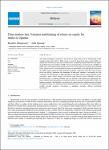Time matters less: Variance partitioning of return on equity for banks in Uganda
Abstract
This study investigates variations in the return on equity (ROE) and its determinants within
Ugandan banks from 2010 to 2020. Using a two-level hierarchical linear model (HLM), we
analyze ROE variability at both time and bank levels, considering temporal effects and the impact
of specific bank-level variables on ROE. Variance decomposition reveals that the variability in
ROE is more attributable to bank-specific factors than to temporal ones, signifying that individual
banks’ practices have a more pronounced impact on performance than time-bound fluctuations.
Our HLM results, marked by high intraclass correlation coefficients (ICC) that range between
64.4% and 85.8%, underscore the dominance of bank-level variables in accounting for ROE
variations. Key determinants of ROE identified by the HLM analysis include inflation, policy
uncertainty, assets, equity, profits, profit margin, asset turnover, equity multipliers, and nonperforming
loans. A primary takeaway from our findings is the potential for operational efficiency
enhancements and judicious investment decisions to produce favorable shifts in ROE. For
banking managers, this highlights the necessity for ongoing process refinement and meticulous
investment scrutiny. We recommend that policymakers mull over incentives for these practices,
possibly through regulatory concessions or guidelines endorsing efficient operational
benchmarks.
Collections
- Research Articles [29]

